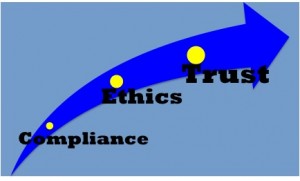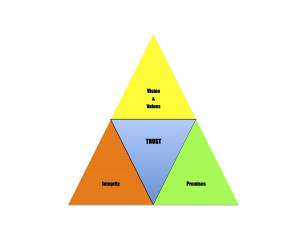What happens when a group of openminded trust, ethics and compliance experts meet for lunch to discuss the intersection of the three disciplines?
One of the tasks at hand was to create a visual representation of the functional interaction between compliance, ethics and trust in an organization.
Copyright (c) 2015, Next Decade, Inc.
What does this mean?
Compliance: While organizations require compliance as a minimum “rule setting/obeying standard,” compliance does not necessarily have an ethics OR a trust mandate. Compliance is merely the starting point, not the end. In fact, it can be trust’s worst enemy when it is assumed that compliance encompasses trust and ethics. Compliance is regulated while ethics and trust are voluntary. In most companies, this distinction is not made and the C&E Officer is usually an attorney who simply enforces the “laws.” He or she may have no understanding of ethics, let alone trust.
Ethics: The “character” component of trust is ethics, and unlike compliance, it is a personal choice. It’s the individual and organizational value system that must be debated, decided and set in place by the Board of Directors, not the CEO. A Chief Ethics Officer, not a C&E Officer, is the distiller of these values. He or she need not be an attorney. So what role does trust play? Unfortunately, both individuals and organizations can be “ethical” without being trustworthy because there are two more attributes that must be present for trust to flourish.
Trust: In order for an individual or organization to be trustworthy it must, at a minimum exhibit not only character (ethics) but competence and consistency in all internal and external relationships. “High trust” companies understand the distinction between compliance, ethics and trust. Going beyond compliance and ethics by adding the trust component results in:
- Less need/emphasis on compliance and it’s oppressive laws and regulations
- Greater employee satisfaction and lower turnover
- Faster decision-making and innovation
- Less risk and fewer crises
- Better relationships not only with customers but all stakeholders
- A happier workplace
- Higher profitability
Companies that understand the distinctions described above and embrace trust as a business imperative are beginning to hire Chief Trust Officers (CTrO), and for good reason(s). They are the “keepers of the golden ticket,” and perhaps the organization’s most valuable employee.
Barbara Brooks Kimmel is the Executive Director of Trust Across America-Trust Around the World whose mission is to help organizations build trust. She runs the world’s largest membership program for those interested in the subject. Barbara is also the editor of the award winning TRUST INC. book series and the Executive Editor of TRUST! Magazine. In 2012 Barbara was named “One of 25 Women Changing the World” by Good Business International.
Our annual poster, 52 Weeks of Activities to Increase Organizational Trust is available to those who would like to support our work by making a small donation.
Did you know we have published 3 books in our award-winning TRUST Inc. series. They are yours when you join our Alliance.
Copyright 2015, Next Decade, Inc.




Recent Comments